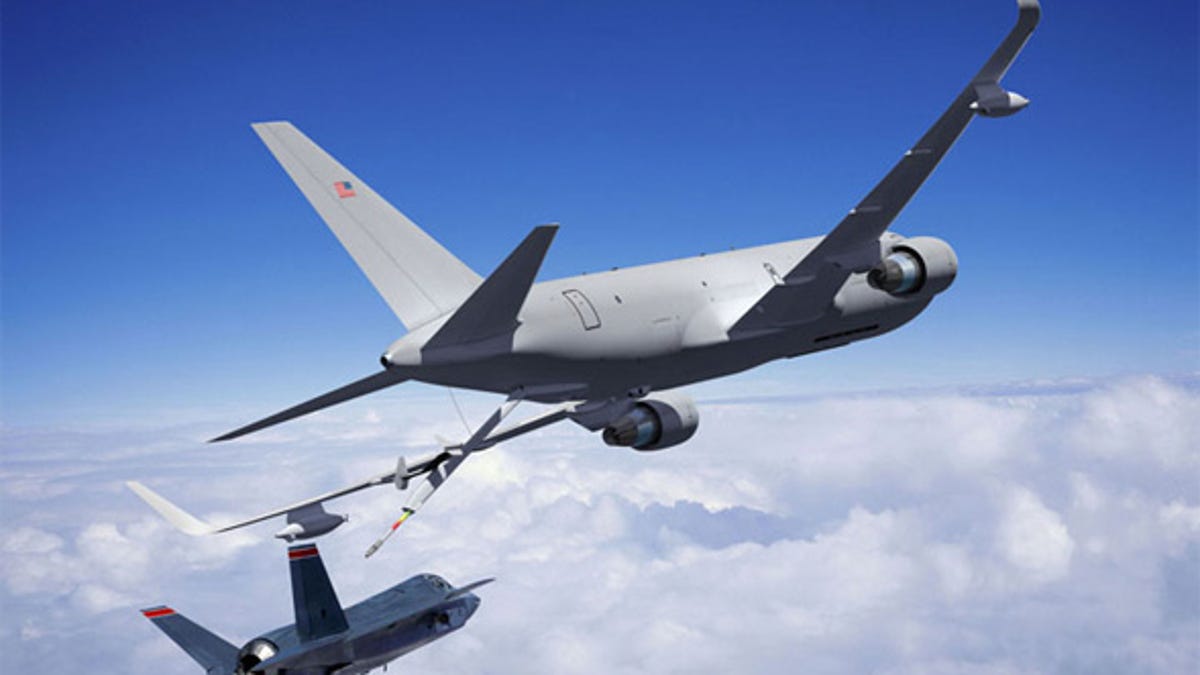Boeing's $30 billion tanker win: No flak from EADS
The European aircraft company says it won't contest the Pentagon's decision to award the hotly contested and very lucrative KC-46A tanker contract to Boeing.

The decade-long war is over: EADS North America has conceded defeat to Boeing in the campaign to capture a multibillion-dollar deal to build a new aerial tanker for the U.S. Air Force.
Last week, the Pentagon announced that it had selected Boeing to build the next-generation KC-46A tanker in a long-term arrangement that could eventually be worth $30 billion. For starters, the Chicago-based aerospace titan is getting $3.5 billion to build the first four of a projected 179 of the new tankers. It has to deliver 18 by 2017.
"Boeing was a clear winner," Deputy Defense Secretary William J. Lynn III said last week.
The new aircraft will be based on the Boeing 767, and it will replace the Air Force's venerable KC-135 Stratotanker and KC-10 Extender--both built by Boeing. The design, which Boeing has been calling the NewGen Tanker, "delivers significantly more fuel, cargo, passengers and patients than the current KC-135 tanker."
Boeing has already delivered a handful of 767-based tanker aircraft to U.S. allies--the Japan Air Self-Defense Force has four, and the Italian Air Force took delivery of its first in December.
The EADS entry that had been under consideration shared key design elements with the company's existing A330 Multi Role Tanker Transport.
EADS took the high road today in its public statements--though offered a velvety promise that it will be there for the Air Force, should the actual building of all those tankers prove to be too much for rival Boeing.
"While we are obviously disappointed that our men and women in uniform are not getting the most capable tanker available, we will not take any action that could further delay the already overdue replacement of the Air Force's aging tanker fleet," said EADS North America Chairman Ralph D. Crosby Jr. in a statement today.
"Much is promised by our competitor, whom we congratulate," Crosby continued. "However, should they fail to deliver, we stand ready to step in with a proven and operating tanker."
But the Pentagon's decision had to be especially galling for EADS, considering that it had actually won the contract in February 2008. That decision was voided when the U.S. Government Accountability Office ruled that Boeing had been treated unfairly in the procurement process. The contest dates back even further. In 2003, Boeing had been the original recipient of the tanker contract, but that deal fell through "due to illegal acts that had involved some Boeing and Pentagon officials," the Defense Department acknowledged last week.
In recent months, the renewed competition saw a relentless PR effort by Boeing that hammered on the theme of supporting jobs in the U.S.--a total of 50,000 in 40 states, the company proclaims--while playing up the "European" aspect of EADS' full name, the European Aeronautic Defence and Space Company. For its part, EADS and its North American unit had pledged to assemble its tanker in Alabama, to the tune of 48,000 American jobs.
Boeing also outspent EADS in the lobbying game by a significant margin, according to the Center for Responsive Politics. In 2010, it shelled out $17.8 million overall (the figures don't get broken down to specific defense projects), compared with just $3.2 million for EADS.
Among the selling points of the winning aircraft itself, Boeing cites a "modern, digital flight deck" that's based on the electronic displays in its new 787 Dreamliner--a commercial aircraft that has endured a long skein of delays and won't reach its first customer until the third quarter of this year, under the latest schedule. It also incorporates a fly-by-wire (that is, electronic) control system, though Boeing qualifies that by saying it's based on "a flight control design philosophy that places aircrews in command rather than allowing computer software to limit combat maneuverability."

